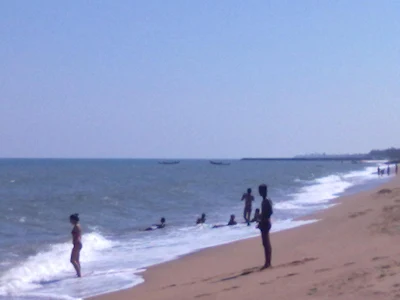Again a collection of short inspirational stories. Manikanth is an editor of vijay karnataka. The book has a small story of the author himself on how he battled the life of poverty. His writing is excellent. Below is the story of ಅಮ್ಮ ಹೇಳಿದ ೮ ಸುಳ್ಳುಗಳು.
ತುಂಬಾ ದೂರ ಅಲ್ಲ ಸಾರ್, ಇಲ್ಲೇ, ಬೆಂಗಳೂರು-ತುಮಕೂರಿನ ಮಧ್ಯೆ ನೆಲಮಂಗಲ ಇದೆಯಲ್ಲ? ಅದಕ್ಕೆ ಅಂಟಿಕೊಂಡ ಹಾಗೇ ಇರುವ ಪುಟ್ಟ ಗ್ರಾಮ ನಮ್ದು. ಹಳ್ಳಿ ಅಂದ್ಮೇಲೆ ಅಲ್ಲಿನ ಬದುಕು ಹೇಗಿರ್ತದೆ ಅಂತ ವಿವರಿಸಬೇಕಿಲ್ಲ ಅಲ್ವ? ನಮಗಂತೂ ಬಡತನವೇ ಬದುಕಾಗಿತ್ತು. ಕೂಲಿ ಕೆಲಸ ಮಾಡ್ತಿದ್ದ ಅಪ್ಪನಿಗೆ ಒಂದು ನಿಶ್ಚಿತ ಆದಾಯ ಅಂತ ಇರಲೇ ಇಲ್ಲ. ಕೆಲಸಕ್ಕೆ ಕರೀತಿದ್ದ ಸಾಹುಕಾರರು ನಾಲ್ಕು ಕಾಸು ಕೊಡ್ತಿದ್ರು ನಿಜ. ಆದ್ರೆ ಅದಕ್ಕೆ ನಾಲ್ಕು ಜನರ ಕೆಲಸ ಮಾಡಿಸಿಕೊಳ್ತಿದ್ರು. ಹಗಲಿಂದ ದುಡಿದು ದುಡಿದು ಸುಸ್ತಾಗ್ತಿತ್ತು ನೋಡಿ, ಅದಕ್ಕೇ ಅಪ್ಪ ಕುಡಿತ ಕಲಿತ. ಸಂಜೆ ಮನೆಗೆ ಬಂದವನು ಅಮ್ಮನಿಗೆ ಒಂದಿಷ್ಟು ದುಡ್ಡು ಕೊಟ್ಟು, ಮಕ್ಕಳನ್ನೆಲ್ಲ ಕುಶಾಲಿನಿಂದ ಮಾತಾಡಿಸಿ, ಸೀದಾ ಹೆಂಡದಂಗಡಿಗೆ ಹೋಗಿಬಿಡುತ್ತಿದ್ದ.
ಇಂಥ ಸಂಕಟದ ಮಧ್ಯೆ, ಸದಾ ಅಣಕಿಸುತ್ತಿದ್ದ ಕಡು ಬಡತನದ ಮಧ್ಯೆ, ಬಂಧುಗಳ ತಾತ್ಸಾರದ ನಡುವೆ, ನೆರೆಹೊರೆಯವರ ಸಣ್ಣ ಮಾತುಗಳ ನಡುವೆ ಅಮ್ಮ ನಮ್ಮನ್ನು ಅದೆಷ್ಟು ಚೆನ್ನಾಗಿ ಬೆಳೆಸಿದಳು ಗೊತ್ತಾ ಸಾರ್? ಆದರೆ ಹಾಗೆ ಬೆಳೆಸುವ ಸಂದರ್ಭದಲ್ಲಿ ಅಮ್ಮ ಸಂದರ್ಭಕ್ಕೆ ತಕ್ಕ ಹಾಗೆ ಸುಳ್ಳು ಹೇಳಿಕೊಂಡೇ ಬಂದಳು. ಆ ಸುಳ್ಳುಗಳ ಹಿಂದೆ ಸಂಕಟವಿತ್ತು. ಹಸಿವಿತ್ತು. ಕಣ್ಣೀರಿತ್ತು. ನಿಟ್ಟುಸಿರಿತ್ತು. ಈ ಬದುಕಿನ ಬಗ್ಗೆ ಬಡತನದ ಬಗ್ಗೆ; ಸಿಡಿಮಿಡಿಯಿತ್ತು. ಏನೂ ಮಾಡಲಾಗದ ತನ್ನ ಅಸಹಾಯಕತೆಯ ಬಗ್ಗೆ ವಿಷಾದವಿತ್ತು. ಮಕ್ಕಳು ಚನ್ನಾಗಿರ್ಲಿ ಎಂಬ ಒಂದೇ ಕಾರಣಕ್ಕಾಗಿ ಅಮ್ಮ ಮೇಲಿಂದ ಮೇಲೆ ಒಂದೊಂದೇ ಸುಳ್ಳು ಹೇಳ್ತಿದ್ಲು. ಅದೆಲ್ಲ ಸುಳ್ಳು ಅಂತ ನಮಗೆ ಗೊತ್ತಾಗುವ ವೇಳೆಗೆ ತುಂಬ ತಡವಾಗಿತ್ತು. ಈಗ, ಅಮ್ಮ ಹೇಳಿದ್ದ ಸುಳ್ಳುಗಳನ್ನೆಲ್ಲ ಸಂದರ್ಭ ಸಹಿತ ನಿಮ್ಮೊಂದಿಗೆ ಹಂಚ್ಕೋಬೇಕು ಅನ್ನಿಸ್ತಿದೆ ಸಾರ್…
****
ನಾನು ಆಗಷ್ಟೇ ಒಂದನೇ ತರಗತಿಗೆ ಸೇರಿದ್ದೆ. ಯಥಾಪ್ರಕಾರ-ಮನೇಲಿ ಮಧಾಹ್ನದ ಬಡತನವಿತ್ತು. ಆದರೆ ಅದು ನಮಗೆ ಗೊತ್ತೇ ಆಗದಂತೆ ಅಮ್ಮ ಎಚ್ಚರ ವಹಿಸಿದ್ದಳು. ಬೆಳಗ್ಗೆ ಹೊತ್ತು ತಿಂಡಿ ತಿಂದು ನಮಗೆ ಅಭ್ಯಾಸವೇ ಇರಲಿಲ್ಲ. ಬೆಳಗ್ಗೆ ಬೆಳಗ್ಗೇನೇ ಅಮ್ಮ ಅಕ್ಕಿಯದೋ, ರಾಗೀದೋ ಗಂಜಿ ಮಾಡ್ತಿದ್ದಳು. ಅಪ್ಪ ಲಗುಬಗೆಯಿಂದ ಗಂಜಿ ಕುಡಿದು ಹೋದ ಮೇಲೆ ಉಳಿದಿದ್ದರಲ್ಲಿ ನಾನು ಅಮ್ಮ ಪಾಲು ಮಾಡ್ಕೋತಾ ಇದ್ವಿ. ತುಂಬಾ ಸಂದರ್ಭಗಳಲ್ಲಿ ಏನಾಗ್ತಾ ಇತ್ತು ಅಂದ್ರೆ- ಅಮ್ಮ ತಟ್ಟೆಗೆ ಗಂಜಿ ಹಾಕಿದ ತಕ್ಷಣ ನಾನು ಗಟಗಟನೆ ಕುಡಿದುಬಿಡ್ತಿದ್ದೆ. ಎರಡೇ ನಿಮಿಷದಲ್ಲಿ ನನ್ನ ತಟ್ಟೆ ಖಾಲಿಯಾದದ್ದು ಕಂಡು ಅಮ್ಮ, ಒಮ್ಮೆ ಮೆಲ್ಲನೆ ನಕ್ಕು- ತನ್ನ ತಟ್ಟೇಲಿ ಇದ್ದುದನ್ನೂ ನನಗೇ ಕೊಡ್ತಿದ್ಲು.
ನಾನು ಅಚ್ಚರಿಯಿಂದ- `ಅಯ್ಯೋ ಯಾಕಮ್ಮಾ ಎಂಬಂತೆ ನೋಡಿದರೆ- ಕಂದಾ, ನನಗೆ ಈಗ ಹಸಿವಾಗ್ತಾನೇ ಇಲ್ಲ ನೋಡಪ್ಪ. ನೀನು ಸ್ಕೂಲಿಗೆ ಹೋಗ್ಬೇಕಲ್ಲ? ಸುಸ್ತಾಗುತ್ತೆ. ತಗೋ, ಹೊಟ್ಟೆ ತುಂಬ ಕುಡಿ. ಹೇಗಿದ್ರೂ ನಂಗೆ ಹಸಿವಾಗ್ತಾ ಇಲ್ಲವಲ್ಲ… ಅನ್ನುತ್ತಿದ್ದಳು.
ಅದು-
ಅಮ್ಮ ಹೇಳಿದ ಮೊದಲ ಸುಳ್ಳು.
* ಬಡವರಿಗೆ ಭಯ-ಭಕ್ತಿ ಜಾಸ್ತಿ ಅಂತಾರೆ. ನಮ್ಮ ಮಟ್ಟಿಗೂ ಈ ಮಾತು ನಿಜವಾಗಿತ್ತು. ಅದೇ ಕಾರಣದಿಂದ ಹಬ್ಬ-ಹರಿದಿನಗಳೂ ಜಾಸ್ತಿ ಇದ್ದವು. ಪ್ರತಿ ಹಬ್ಬಕ್ಕೂ ಬೆಲ್ಲದ ಪಾಯಸವೇ ಸ್ಪೆಷಲ್ಲು! ಆಗಲೂ ಅಷ್ಟೇ ಸಾರ್. ಅಮ್ಮ ಒಂದು ಪಾತ್ರೇಲಿ ಪಾಯಸ ಮಾಡಿರ್ತಾ ಇದ್ದಳು. ಹಬ್ಬದ ದಿನ ಮಾತ್ರ ಗಂಜಿಯ ಬದಲಿಗೆ ಅನ್ನ ಮಾಡಿರ್ತಾ ಇದ್ಳು. ನಾನು ಆಸೆಯಿಂದ ತಟ್ಟೆ ತುಂಬಾ ಅನ್ನ ಹಾಕಿಸ್ಕೊಂಡು ಗಬಗಬಾಂತ ತಿಂದು ಮುಗಿಸ್ತಿದ್ದೆ. ಆಮೇಲೆ ಒಂದು ರೌಂಡ್ ಪಾಯಸ ಕುಡಿದು, ಮತ್ತೆ ಆ ಪಾತ್ರೆಯ ಕಡೆಗೇ ಆಸೆಯಿಂದ ನೋಡ್ತಿದ್ದೆ ನೋಡಿ- ಆಗಲೇ ಅಮ್ಮ ಅಷ್ಟೂ ಪಾಯಸವನ್ನು ನಂಗೆ ಕೊಟ್ಟು- `ಕಂದಾ, ಎಲ್ಲವನ್ನೂ ಕುಡ್ಕೋ. ನನಗೆ ವಿಪರೀತ ಹಲ್ಲು ನೋವು ಕಣಪ್ಪಾ. ಜತೆಗೆ ಸಿಹಿ ಅಂದ್ರೆ ನಂಗೆ ಇಷ್ಟವಿಲ್ಲ’ ಅಂದುಬಿಡುತ್ತಿದ್ದಳು.
ನಂತರ ಸರಸರನೆ ಅಡುಗೆ ಮನೆಗೆ ಹೋಗಿ, ಒಂದು ಚೊಂಬಿನ ತುಂಬಾ ನೀರು ಕುಡಿದು- `ಹೌದಪ್ಪಾ, ನನಗೆ ಸಿಹಿ ಇಷ್ಟವಿಲ್ಲ’ ಅಂತಿದ್ಲು.
ಅದು-
ಅಮ್ಮ ಹೇಳಿದ ಎರಡನೇ ಸುಳ್ಳು!
* ಆಗಷ್ಟೇ ನಾನು ಐದನೇ ತರಗತಿಗೆ ಬಂದಿದ್ದೆ. ಸ್ಕೂಲಿಂದ ಟೂರ್ ಹೊರಟಿದ್ರು. ಒಬ್ಬರಿಗೆ ೩೦೦ ರೂ. ಶುಲ್ಕ. ಎಲ್ಲ ವಿಷಯ ಹೇಳಿ- `ಅಪ್ಪಾ, ಕಾಸು ಕೊಡಪ್ಪಾ’ ಅಂದೆ. `ಮಗಾ, ಇಡೀ ವರ್ಷ ದುಡಿದ್ರೂ ನನಗೆ ಅಷ್ಟು ದುಡ್ಡು ಸಿಗಲ್ಲ. ಬಡವಾ ನೀ ಮಡಗಿದಂಗಿರು ಅಂದಿದಾರೆ ದೊಡ್ಡವರು. ಹಾಗೇ ಇರು. ಟೂರೂ ಬೇಡ, ಗೀರೂ ಬೇಡ’ ಅಂದೇಬಿಟ್ಟ ಅಪ್ಪ.
ಅವತ್ತಿಂದಲೇ ಹಗಲಿಡೀ ಕೆಲಸ ಮುಗಿಸಿ, ರಾತ್ರಿ ಅದೆಷ್ಟೋ ಹೊತ್ತಿನವರೆಗೂ ಬೀಡಿ ಕಟ್ತಾ ಇರ್ತಿದ್ಲು ಅಮ್ಮ. ಯಾಕಮ್ಮಾ ಹೀಗೆ ಅಂದ್ರೆ- `ನಂಗೆ ರಾತ್ರಿ ಹೊತ್ತು ನಿದ್ರೇನೇ ಬರ್ತಿಲ್ಲ ಮಗನೇ’ ಅಂದು ಕೆಲಸ ಮುಂದುವರಿಸ್ತಾ ಇದ್ಳು. ಕಡೆಗೊಂದು ದಿನ ಮುದುರಿ ಮುದುರಿ ಮುದುರಿಕೊಂಡಿದ್ದ ನೋಟುಗಳನ್ನೆಲ್ಲ ಕೊಟ್ಟು-ಟೂರ್ಗೆ ಹೋಗಿದ್ದು ಬಾಪ್ಪ ಅಂದಳು. ಅದು ಸಾಲ ಮಾಡಿದ ಹಣ ಎದು ನನಗೆ ಗೊತ್ತಾಗುವ ವೇಳೆಗೆ ಅಮ್ಮ ಮತ್ತೆ ಬೀಡಿ ಕಟ್ಟಳು ಕುಳಿತಾಗಿತ್ತು. ಹಿಂದೆಯೇ- `ಅಯ್ಯೋ ನಂಗೆ ನಿದ್ರೇನೇ ಬರ್ತಿಲ್ಲ’ ಎಂಬ
ಅದೇ ಹಳೆಯ ಮಾತು ಬೇರೆ. ಹೌದು. ಅದು
ಅಮ್ಮ ಹೇಳಿದ ಮೂರನೇ ಸಳ್ಳು.
* ಏಳನೇ ತರಗತಿಗೆ ಬರುವ ವೇಳೆಗೆ ನನಗೆ ಸ್ಕಾಲರ್ಷಿಪ್ ಬಂತು. ಭರ್ತಿ ನೂರು ರೂಪಾಯಿ. ಅದರಲ್ಲಿ ಅಮ್ಮನಿಗೆ ಒಂದು ಹೊಸ ಸೀರೆ ತೆಗೆದುಕೊಡೋಣ ಅಂತ ಆಸೆಯಿತ್ತು. ದುಡ್ಡನ್ನು ಅಮ್ಮನಿಗೆ ಕೊಟ್ಟು, `ಕೆಂಪು ಕಲರ್ದು ಒಂದು ಸೀರೆ ತಗೋಮ್ಮ. ಅದರಲ್ಲಿ ನೀನು ಚೇಂದ ಕಾಣ್ತೀಯ’ ಅಂದೆ.
ಅಷ್ಟಕ್ಕೇ ನನ್ನನ್ನು ಬಾಚಿ ತಪ್ಪಿಕೊಂಡು ಹಣೆಗೆ ಮುತ್ತಿಟ್ಟು, ನಿಂತಲ್ಲೇ ಬಿಕ್ಕಳಿಸಿದಳು ಅಮ್ಮ. ನಂತರ, ಅವತ್ತೇ ಸಂತೆಗೆ ಹೋಗಿ ಅಪ್ಪನಿಗೂ-ನನಗೂ ಹೊಸ ಬಟ್ಟೆ ತಂದಳು.
`ನಿನಗೆ’ ಅಂದಿದ್ದಕ್ಕೆ- ನನಗ್ಯಾಕಪ್ಪ ಬಟ್ಟೆ? ನನಗೆ ಅಂಥ ಆಸೆಯೇನೂ ಇಲ್ಲ ಎಂದು ತೇಲಿಸಿ ಮಾತಾಡಿದಳು.
ಅದು-
ಅಮ್ಮ ಹೇಳಿದ ನಾಲ್ಕನೇ ಸುಳ್ಳು!
* ಕೆಲಸ ಮತ್ತು ಕುಡಿತ ಎರಡೂ ವಿಪರೀತ ಇತ್ತಲ್ಲ, ಅದೇ ಕಾರಣದಿಂದ ಅಪ್ಪ ಅದೊಂದು ದಿನ ದಿಢೀರ್ ಸತ್ತು ಹೋದ. ಆಗ ಅಮ್ಮನಿಗೆ ಬರೀ ೩೨ ವರ್ಷ! ಸಂಸಾರದ ದೊಡ್ಡ ಹೊರೆ ಅಮ್ಮನ ಹೆಗಲಿಗೆ ಬಿತ್ತು. ಬಡತನದ ಮಧ್ಯೆ, ಹಸಿವಿನ ಮಧ್ಯೆ, ಹೋರಾಟದ ಮಧ್ಯೆಯೇ ಬದುಕಿದೆವಲ್ಲ, ಹಾಗಾಗಿ ಅಮ್ಮನಿಗೆ ದಾಂಪತ್ಯ ಸುಖ ಅಂದರೆ ಏನೆಂದೇ ಗೊತ್ತಾಗಿರಲಿಲ್ಲ. ಅದನ್ನೇ ಪಾಯಿಂಟ್ ಎಂದಿಟ್ಟುಕೊಂಡ ಬಂಧುಗಳು- `ಇನ್ನೊಂದು ಮದುವೆ ಮಾಡ್ಕೊಳ್ಳೇ. ನಿಂಗಿನ್ನೂ ಚಿಕ್ಕ ವಯಸ್ಸು. ಗಂಡಿನ ಸಾಂಗತ್ಯ ಬಯಸುವ ವಯಸ್ಸು ಅದು’ ಎಂದೆಲ್ಲಾ ಒತ್ತಾಯಿಸಿದರು.
`ಇಲ್ಲ. ಇಲ್ಲ. ನನ್ನೆದೆಯಲ್ಲಿ ಈಗ ಪ್ರೀತಿ-ಪ್ರೇಮ, ಪ್ರಣಯ ಎಂಬಂಥ ಸೆಂಟಿಮೆಂಟಿಗೆ ಜಾಗವೇ ಇಲ್ಲ’ ಅಂದು ದೃಢವಾಗಿಯೇ ಹೇಳಿಬಿಟ್ಟಳಲ್ಲ ಅಮ್ಮ…
ನಂಗೆ ಗೊತ್ತು. ಅದು,
ಅಮ್ಮ ಹೇಳಿದ ಐದನೇ ಸುಳ್ಳು.
* ಓದು ಮುಗಿದದ್ದೇ ತಡ, ನಂಗೆ ಕೆಲಸ ಸಿಕ್ತು. ಸಿಟಿಯಲ್ಲಿ ದೊಡ್ಡ ಮನೆ ಮಾಡಿದೆ. ಒಂದಿಷ್ಟು ದುಡ್ಡು ಮಾಡಿಕೊಂಡೆ. ಅಮ್ಮ ನನಗೋಸ್ಕರ ಪಟ್ಟ ಕಷ್ಟವೆಲ್ಲ ಗೊತ್ತಿತ್ತಲ್ಲ, ಅದೇ ಕಾರಣದಿಂದ, ಈ ಹಣವನ್ನೆಲ್ಲ ಅಮ್ಮನ ಕೈಗಿಟ್ಟು- `ಇದೆಲ್ಲಾ ನಿನ್ನದು ಅಮ್ಮಾ. ತಗೊಂಡು ಹಾಯಾಗಿರು. ಈಗಿಂದಾನೇ ಕೆಲಸ ಮಾಡೋದು ನಿಲ್ಸು. ಈ ಗುಡಿಸಲಿನಂಥ ಮನೆ ಬಿಟ್ಟು ಬೆಂಗಳೂರಿಗೆ ಬಾ. ನನ್ನ ಜತೇಲೇ ಇದ್ದು ಬಿಡು’ ಎಂದೆಲ್ಲಾ ಹೇಳಬೇಕು ಅನ್ನಿಸ್ತು.
ಸಡಗರದಿಂದಲೇ ಊರಿಗೆ ಹೋದವನು-ಎಲ್ಲವನ್ನೂ ಹೇಳಿದೆ. ಅಷ್ಟೂ ದುಡ್ಡನ್ನು ಅಮ್ಮನ ಮುಂದೆ ಸುರಿದೆ. ಅಮ್ಮ ಅದನ್ನು ನೋಡಲೇ ಇಲ್ಲ ಎಂಬಂತೆ, ಅಷ್ಟನ್ನೂ ತೆಗೆದು ನನ್ನ ಕೈಲಿಟ್ಟು ಹೇಳಿದಳು: `ಮಗಾ, ನನ್ನತ್ರ ದುಡ್ಡಿದೆ ಕಣಪ್ಪಾ. ಮಡಿಕೆ, ಕುಡಿಕೆಯಲ್ಲೆಲ್ಲ ಅಡಗಿಸಿಟ್ಟಿದೀನಿ ಕಣೋ. ಅದೆಲ್ಲ ಖರ್ಚಾದ ಮೇಲೆ ನಿನ್ನ ಹತ್ರ ಕೇಳ್ತೀನಿ. ಸದ್ಯಕ್ಕಂತೂ ನನಗೆ ದುಡ್ಡಿನ ಅಗತ್ಯಾನೇ ಇಲ್ಲ…
ಅದು- ಹೌದು, ಅದು
ಅಮ್ಮ ಹೇಳಿದ ಆರನೇ ಸುಳ್ಳು.
* ಉಹುಂ, ಅಮ್ಮ ನನ್ನ ಯಾವುದೇ ಆಸೆಗೂ ಅಡ್ಡಿ ಬರಲಿಲ್ಲ. ಮುಂದೆ- ನನ್ನಿಷ್ಟದಂತೆಯೇ ಮದುವೆಯಾಯಿತು. ಶ್ರೀಮಂತರ ಮನೆಯಿಂದ ಬಂದಿದ್ದ ನನ್ನ ಹೆಂಡತಿ ಅಮ್ಮನಿಗೆ ಅಡ್ಜೆಸ್ಟ್ ಆಗಲೇ ಇಲ್ಲ. ಅಮ್ಮನ ಮೇಲೆ ಅವಳದು ದಿನಾಲೂ ಒಂದಲ್ಲ ಒಂದು ದೂರು. ನಿಮ್ಮಲ್ಲಿ ಸುಳ್ಳು ಹೇಳೋದೇಕೆ ಸಾರ್? ಪ್ರಾಯದ ಮದ, ಹೆಂಡತಿ ಮೇಲಿನ ಮೋಹ ನೋಡಿ, ನಾನೂ ಅವಳ ತಾಳಕ್ಕೆ ತಕ್ಕಂತೆಯೇ ಕುಣಿದೆ. ಒಂದೆರಡು ಬಾರಿ ಅಮ್ಮನನ್ನೇ ಗದರಿಸಿಬಿಟ್ಟೆ. ಹೊಂದಾಣಿಕೆ ಮಾಡ್ಕೊಂಡು ಹೋಗೋಕ್ಕಾಗಲ್ವ ಎಂದು ರೇಗಿಬಿಟ್ಟೆ.
ಅವತ್ತು ಇಡೀ ದಿನ ಅಮ್ಮ ಮಂಕಾಗಿದ್ದಳು. ಆ ದೃಶ್ಯ ಕಂಡದ್ದೇ-ನನಗೆ ಕಪಾಲಕ್ಕೆ ಹೊಡೆದಂತಾಯಿತು. `ಅಮ್ಮಾ. ತಪ್ಪಾಯ್ತು ಕ್ಷಮಿಸು’ ಎಂದು ನಾನು ಕೇಳುವ ಮೊದಲೇ-
`ನಾನು ಹಳೇ ಕಾಲದ ಹೆಂಗ್ಸು. ತಪ್ಪು ಮಾಡಿಬಿಟ್ಟೆ. ಕ್ಷಮಿಸಿಬಿಡ್ರಪ್ಪಾ’ ಎಂದ ಅಮ್ಮ `ನಮ್ಮಿಬ್ಬರದೂ ತಪ್ಪಿಲ್ಲ’ ಎಂದು ಘೋಷಿಸಿದಳು.
ಅದು-
ಅಮ್ಮ ಹೇಳಿದ ಏಳನೇ ಸುಳ್ಳು.
* ಕಾಲ ಅನ್ನೋದು ಕೃಷ್ಣ ಚಕ್ರದ ಥರಾ ಗಿರಗಿರಗಿರಾಂತ ಓಡಿಬಿಡ್ತು. ಅಮ್ಮ ಆಸ್ಪತ್ರೆ ಸೇರಿದ್ದಳು. ದಡಬಡಿಸಿ ಹೋದರೆ- `ನಿಮ್ಮ ತಾಯಿಗೆ ಕ್ಯಾನ್ಸರ್ ಕಣ್ರೀ. ಆಗಲೇ ಫೈನಲ್ ಸ್ಟೇಜ್ಗೆ ಬಂದು ಬಿಟ್ಟಿದ್ದಾರೆ. ತಕ್ಷಣ ಆಸ್ಪತ್ರೆಗೆ ಸೇರಿಸಿ. ಇನ್ನು ಕೆಲವೇ ದಿನ ಅವರು ಬದುಕೋದು. ಆಗಾಗಿ ಹುಶಾರಾಗಿ ನೋಡಿಕೊಳ್ಳಿ ಅಂದ್ರು ಡಾಕ್ಟರ್.
ನಾನು ಹೆದರುತ್ತ, ಹೆದರುತ್ತಲೇ ಅಮ್ಮನ ಬಳಿ ಬಂದೆ. ಒಂದು ಕಾಲದಲ್ಲಿ ಸುರಸುಂದರಿಯಂತಿದ್ದ ಅಮ್ಮ; ತನ್ನ ಪಾಡಿಗೆ ತಾನೇ ಹಾಡು ಹೇಳಿಕೊಂಡು ಡ್ಯಾನ್ಸು ಮಾಡುತ್ತಿದ್ದ ಅಮ್ಮ; ಮಿಣುಕು ದೀಪದ ಬೆಳಕಲ್ಲಿ ಅಪ್ಸರೆಯಂತೆ ಕಾಣುತ್ತಿದ್ದ ಅಮ್ಮ; ದಿನವೂ ನನಗೆ ದೃಷ್ಟಿ ತೆಗೆಯುತ್ತಿದ್ದ ಅಮ್ಮ; ತನ್ನ ಪಾಲಿನ ಊಟವನ್ನೆಲ್ಲ ನನಗೇ ಕೊಡುತ್ತಿದ್ದ ಅಮ್ಮ; ಎಲ್ಲ ಸಂಕಟಗಳಿಗೂ ಸವಾಲು ಹಾಕಿ ಗೆದ್ದ ಅಮ್ಮ- ಜೀವಚ್ಛವವಾಗಿ ಮಲಗಿದ್ದಳು. ಆಕೆಯ ಕಂಗಳಲ್ಲಿ ಕಾಂತಿ ಇರಲಿಲ್ಲ. ಕಂಬನಿಯೂ ಇರಲಿಲ್ಲ.
ಅಮ್ಮನನ್ನು ಆ ಸ್ಥಿತಿಯಲ್ಲಿ ನೋಡಿದ್ದೇ ನನಗೆ ಕಣ್ತುಂಬಿ ಬಂತು. ಆಕೆಯನ್ನು ಕಡೆಗಾಲದಲ್ಲಿ ಚೆನ್ನಾಗಿ ನೋಡಿಕೊಳ್ಳಲಿಲ್ಲ ಎಂಬ ಗಿಲ್ಟ್ ಕಾಡಿತು. ತಕ್ಷಣವೇ, ಅದು ಆಸ್ಪತ್ರೆ ಎಂಬುದನ್ನೂ ಮರೆತು- ಜೋರಾಗಿ ಬಿಕ್ಕಳಿಸಿದೆ.
ತಕ್ಷಣವೇ, ನಡುಗುತ್ತಿದ್ದ ಕೈಗಳಿಂದ ನನ್ನ ಕಂಬನಿ ತೊಡೆದ ಅಮ್ಮ ಹೇಳಿದಳು: ನಂಗೇನೂ ಆಗಿಲ್ಲ ಕಂದಾ, ಅಳಬೇಡ. ನಂಗೇನೂ ಆಗಿಲ್ಲ…
ಅದು,
ಅಮ್ಮ ಹೇಳಿದ ಎಂಟನೇ ಸುಳ್ಳು!
***
ಅವತ್ತೇ ರಾತ್ರಿ ಅಮ್ಮ ಕಣ್ಮುಚ್ಚಿ ನಿದ್ರೆಗೆ ಜಾರಿದಳು. ಆಕೆಯ ಪಾಲಿಗೆ ಮತ್ತೆ ಬೆಳಕಾಗಲಿಲ್ಲ!
ನಾಡಿದ್ದು ಗೌರಿ ಹಬ್ಬ ಅಂದುಕೊಮಡಾಕ್ಷಣ ಅಮ್ಮ ನೆನಪಾದಳು. ಈಗ ಹೇಗಿದ್ದಾಳೋ















